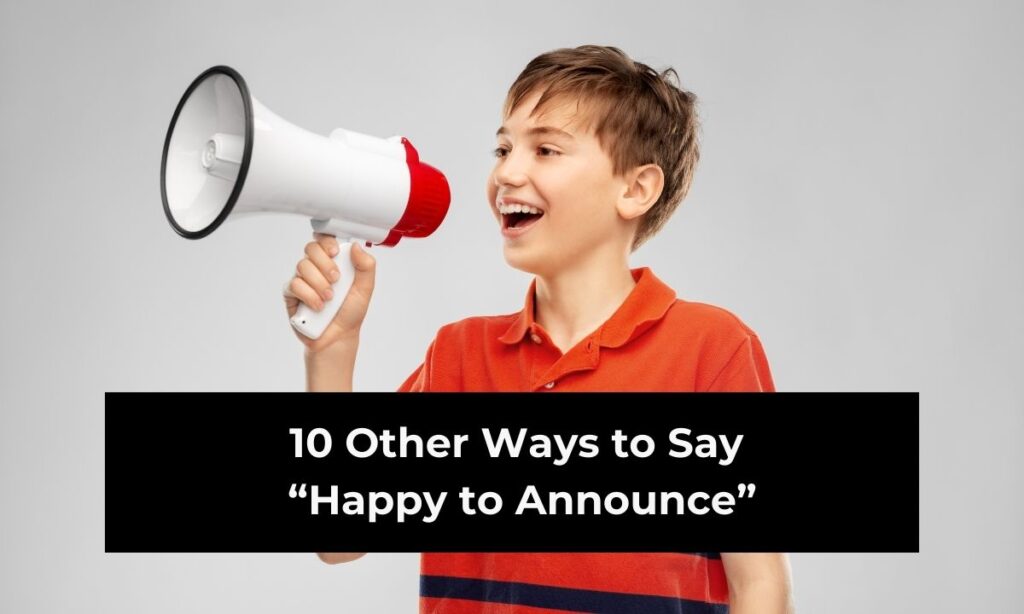Whenever you have exciting news to share, your first instinct might be to write “Happy to Announce.” It’s short, simple, and effective. But if you use the same phrase too often, it can start to feel repetitive and lose its impact. Whether you’re making a professional announcement, celebrating a milestone, or sharing something personal with friends and family, the way you phrase your words matters more than you might think.
Think about this—when you’re scrolling through social media or reading a newsletter, what makes you stop and pay attention? It’s often the wording. Unique phrasing grabs attention, sets the tone, and makes people want to read more. That’s why finding alternatives to “Happy to Announce” can help you make your messages feel fresh, personal, and memorable.
In this article, you’ll discover ten creative and effective alternatives to the phrase “Happy to Announce.” Each option is explained in detail, so you’ll know exactly when and how to use it. You’ll also see how these phrases can make your announcements more engaging and better suited to your audience.

Whether you’re writing a professional email, a business update, a social media post, or a personal note, these alternatives will help you sound both authentic and exciting. Instead of falling back on the same wording, you’ll have a variety of phrases ready to use—each one tailored to create just the right level of enthusiasm and warmth.
Must Read:
- Other Ways to Say “Happy to Assist”
- Other Ways to Say “Make a Difference”
- Other Ways to Say “Let’s Do This”
Let’s dive into ten other ways you can confidently say “Happy to Announce” while keeping your announcements clear, creative, and inspiring.
1. “Thrilled to Share”
When you use the phrase “Thrilled to Share,” you instantly communicate a high level of excitement. Unlike “Happy to Announce,” which can feel a little formal, this choice feels energetic and heartfelt. It’s perfect for moments when you want your audience to feel your enthusiasm and sense of joy.
You might use this phrase when announcing a new project, a personal achievement, or even something casual like an upcoming trip. For example: “Thrilled to share that my new book is now available!” This wording invites your readers to celebrate with you and builds a sense of shared excitement.
The word “thrilled” is especially powerful because it paints a clear emotional picture. People can imagine the joy behind the message. It also works well in both professional and casual contexts, making it versatile for many types of announcements.
If you want your news to feel personal and filled with genuine excitement, this phrase works beautifully. It helps you avoid sounding repetitive while keeping your audience engaged and eager to know more.
2. “Excited to Reveal”
“Excited to Reveal” adds an element of surprise and anticipation to your announcement. It works best when you’re introducing something new that your audience has been waiting for or when you want to create a sense of unveiling.
For example, if you’re launching a product or sharing a behind-the-scenes project, you could say: “Excited to reveal our latest collection that we’ve been working on for months.” The word “reveal” suggests that something special has been hidden until now, which makes your audience curious and more likely to engage.
This phrase works particularly well for announcements in creative industries—designers, artists, entrepreneurs, or content creators often use it to build hype. But it can also be used in personal situations, like sharing a big life update.
When you want to spark curiosity while still showing enthusiasm, “Excited to Reveal” is an excellent alternative that feels dynamic and engaging.
3. “Delighted to Announce”
If you’re looking for something polished and professional, “Delighted to Announce” is a wonderful choice. It has a touch of formality while still sounding warm and sincere. This makes it especially useful in business communications, academic updates, or official events.
For example, you might write: “Delighted to announce that our company has partnered with a leading organization to bring new opportunities to our clients.” The word “delighted” conveys a sense of pride and happiness without being overly casual.
This phrase helps you strike the right balance when you want your announcement to feel respectful yet enthusiastic. It’s ideal for newsletters, press releases, or workplace communications where tone matters.
By choosing “Delighted to Announce,” you show your audience that you value the moment while maintaining professionalism and grace.
4. “Pleased to Share”
“Pleased to Share” is another polished option, but it has a slightly softer tone than “Delighted to Announce.” It communicates contentment and satisfaction without sounding overly dramatic.
For example, if you’re posting about a completed milestone, you might say: “Pleased to share that our team successfully finished the project ahead of schedule.” It makes the announcement sound confident and composed, which is often the best tone for professional settings.
This phrase is especially good for announcements that you want to deliver with humility and professionalism. It works well in corporate emails, academic settings, and formal posts, but it can also be used for personal achievements when you want to sound gracious.
“Pleased to Share” is an excellent option if you want your message to feel calm, dignified, and polished while still highlighting your positive news.
5. “Overjoyed to Announce”
Sometimes your news is so exciting that “happy” doesn’t feel strong enough. That’s where “Overjoyed to Announce” comes in. This phrase communicates deep excitement and genuine happiness, making it a perfect choice for big, personal milestones.
Think about announcing an engagement, a new job, or the birth of a child. For instance: “Overjoyed to announce the arrival of our baby girl.” This wording feels emotional and heartfelt, allowing your audience to connect with your joy on a personal level.
Unlike the more professional phrases, this one works best for personal and emotional updates. It emphasizes the significance of the moment and invites your audience to celebrate alongside you.
If you want your announcement to feel warm, genuine, and deeply meaningful, “Overjoyed to Announce” is an excellent way to share your news.
6. “Proud to Share”
When your announcement is tied to achievement or success, “Proud to Share” is a strong and meaningful phrase to use. It communicates not just happiness but also a sense of accomplishment and pride.
For example: “Proud to share that our team has been awarded top honors for innovation.” This phrase highlights effort, dedication, and results, making it particularly effective for professional and academic milestones.
It also works beautifully in personal contexts. Imagine saying: “Proud to share that my child graduated with honors.” It communicates love and pride without feeling boastful.
This phrase works well when you want your audience to feel the depth of effort and dedication behind your news. It shows that the announcement is more than just good news—it’s an achievement worth celebrating.
7. “Honored to Announce”
Sometimes your announcement is tied to recognition or a special opportunity. In those cases, “Honored to Announce” is an excellent phrase. It expresses humility, gratitude, and respect while still sharing good news.
For example, you might write: “Honored to announce that I’ll be speaking at this year’s industry conference.” This wording shows that you don’t take the opportunity for granted and that you value the recognition.
It’s a wonderful phrase to use in professional and academic settings, especially when the news involves awards, invitations, or acknowledgments. It helps you highlight your achievement while showing gratitude to those who made it possible.
When you want to express humility alongside excitement, “Honored to Announce” strikes the perfect balance.
8. “Excited to Share”
“Excited to Share” is simple, casual, and versatile. It’s a great alternative when you want to sound approachable and genuine without being too formal.
For example: “Excited to share that our new blog series goes live this week!” This phrase feels lighthearted and conversational, which makes it perfect for social media, newsletters, or casual updates.
Unlike phrases that carry a strong emotional weight, “Excited to Share” works in almost any context. It’s professional enough for work-related news but still casual enough for personal updates.
If you want a phrase that works across multiple situations and resonates with your audience in a friendly way, “Excited to Share” is a safe and effective choice.
9. “Thrilled to Announce”
While similar to “Thrilled to Share,” this variation feels slightly more formal because of the word “announce.” It combines the excitement of “thrilled” with the structure of an announcement, making it a versatile phrase that works in both personal and professional contexts.
For example: “Thrilled to announce that our nonprofit has reached its fundraising goal!” This phrase communicates energy and joy while still keeping the announcement structured and professional.
It’s a great option when you want to show enthusiasm but also maintain a sense of authority and formality. Whether you’re sharing personal news, organizational milestones, or exciting events, “Thrilled to Announce” feels balanced and impactful.
10. “Grateful to Share”
Sometimes your announcement is less about excitement and more about gratitude. That’s where “Grateful to Share” fits in. It highlights appreciation while still sharing your news in a meaningful way.
For example: “Grateful to share that I’ve been given the opportunity to lead this year’s project.” This wording emphasizes humility and acknowledgment, showing that your news is tied to support or recognition from others.
This phrase works best in professional, academic, or personal situations where gratitude is a key part of your message. It softens your announcement while still making it clear and engaging.
If you want your audience to feel your appreciation while sharing positive news, “Grateful to Share” is an excellent choice.
Conclusion
The phrase “Happy to Announce” is simple and effective, but using it over and over can make your updates sound predictable. By choosing creative alternatives, you can make your announcements feel fresh, personal, and more engaging.
Whether you choose words like “Thrilled to Share,” “Honored to Announce,” or “Grateful to Share,” each phrase carries a unique tone that helps your audience connect with your message. Some phrases work better in professional settings, while others shine in personal contexts. By mixing and matching, you’ll always have the perfect way to share your news.
The key is to match the phrase with the tone of your announcement. If your news is casual, choose something light and conversational. If it’s formal or professional, opt for polished and respectful wording. And if it’s personal and heartfelt, pick something emotional and warm.
When you thoughtfully choose your words, your announcements won’t just inform—they’ll inspire, connect, and celebrate in the best way possible.
FAQs
1. Why should I avoid using “Happy to Announce” too often?
Because it can sound repetitive and lose its impact over time. Using alternatives helps keep your announcements fresh and engaging.
2. Can I use these alternatives in professional emails?
Yes, phrases like “Delighted to Announce,” “Pleased to Share,” and “Honored to Announce” work well in professional settings.
3. Which alternatives are best for personal updates?
Phrases like “Overjoyed to Announce” and “Grateful to Share” are great for personal milestones and heartfelt moments.
4. How do I choose the right phrase?
Match the tone of your announcement to the phrase. Use formal options for professional contexts and emotional ones for personal updates.
5. Can I mix different phrases for variety?
Absolutely. Rotating your word choices keeps your announcements fresh and ensures they always resonate with your audience.





